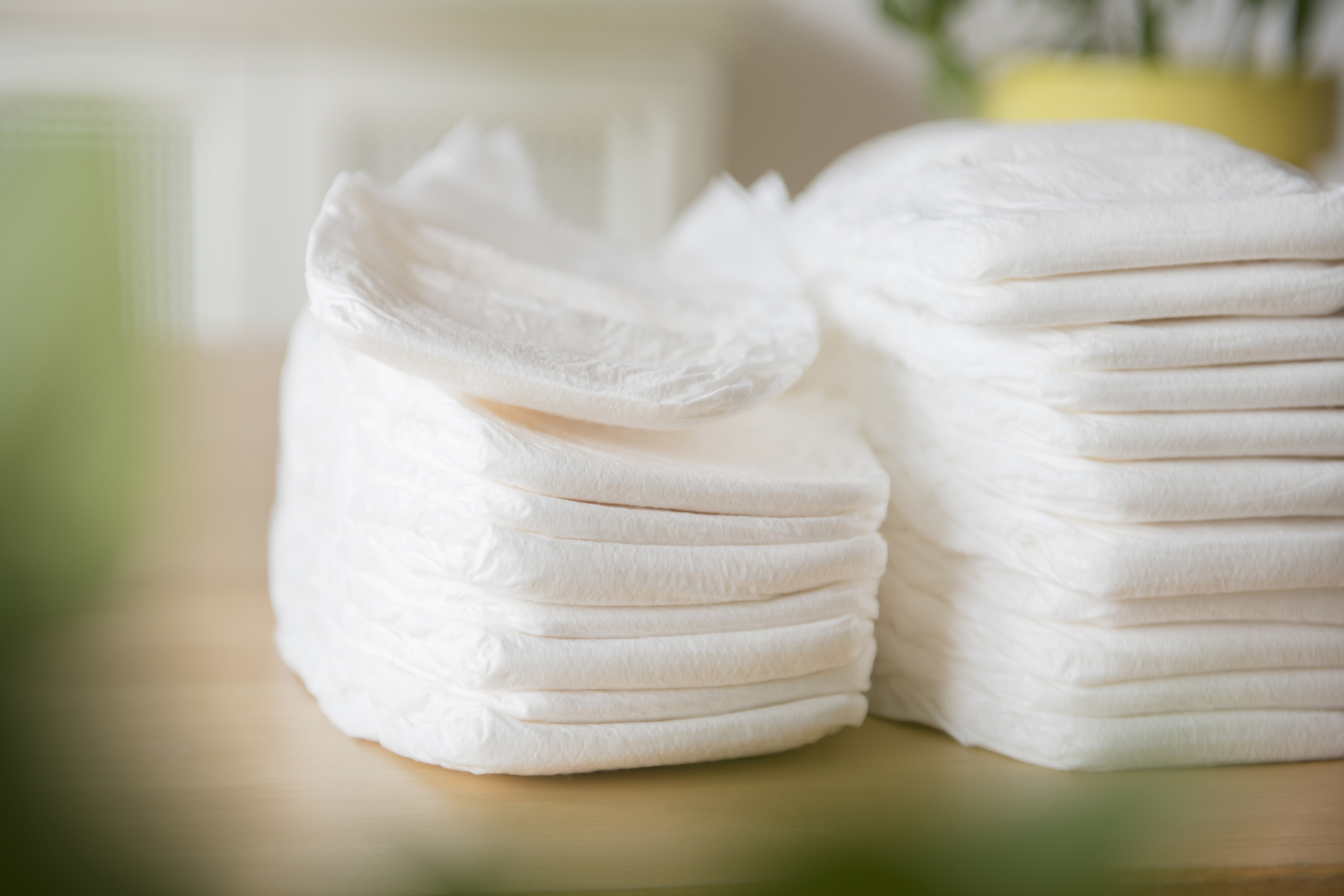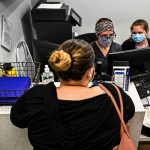Your trusted source for contextualizing the news. Sign up for our daily newsletter.
Over the past 10 years, distribution at Doug Adair’s Nashville diaper bank has swelled from a couple of thousand diapers a year to nearly 3 million. Running the bank, Adair has learned and relearned the critical role diaper access plays for families. But it hasn’t always felt like most other people knew that.
“I think more about diapers than anybody my age that is not wearing them — yet,” said Adair, a 68-year-old former mortgage banker turned diaper banker who got into this line of work because, in his words, he asked the second most expensive question he has ever asked in his life: “What can I do to help?”
Adair started Nashville Diaper Connection because there were only two places where families could get free diapers in Nashville in 2013, and one of them had a six-week waiting list. The city has no federal, state or local assistance program for diapers specifically, and families couldn’t use food stamps or WIC, the federal assistance program for women and children, to buy diapers.
To people like Adair — who run banks with little support — diaper need, or a lack of sufficient diapers to keep babies dry and healthy, has felt invisible. But after years of going largely unaddressed by legislators across the country, something has started to shift.
The U.S. Department of Health and Human Services launched the first-ever federally funded diaper distribution program in September 2022, sending more than $8 million in grants to states and tribes to help with their efforts to tackle diaper need; this year, it renewed the program. And state after state has started to pass bills exempting diapers from sales tax: Florida, Maryland, Colorado, Virginia, Texas, Iowa, Maine and North Dakota have all passed exemptions, and more are in the works. Nevada voters will take up the issue in November 2024. In Ohio, a bill unanimously passed the Senate.
And in Tennessee, the state went even further.
-
Read Next:
Republican Gov. Bill Lee proposed a program that would cover half the cost of diapers during the first two years of a baby’s life for children on TennCare, Tennessee’s Medicaid program. Pending approval from the federal Centers for Medicare & Medicaid Services, it would likely go in effect in January 2024, TennCare told The 19th.
If successful, the program — which Lee called “pro-life” and “pro-family” — would be a completely new approach to addressing diaper need. Adair was shocked when he first heard it.
“As you can imagine, my phone started lighting up. I’m naturally skeptical, I’m not overly generous to our political leaders,” he said. “I think it is a game changer if they can pull it off.”
The current policy focus on diaper need has been driven by a confluence of factors that could make 2023 a banner year in terms of diaper legislation. Renewed attention following the pandemic has collided with the reversal of Roe v. Wade, encouraging state legislatures, some of which have budget surpluses this year, to search in their coffers for opportunities to support families.
Adair said he saw the first signs of a change following the pandemic, which in Nashville was preceded by a tornado just days before.
“Everybody needed everything and with the onset of the pandemic rush, when they wiped out toilet paper, they also wiped out diapers,” he said.
In Texas, Holly McDaniel saw that at the Austin Diaper Bank, which had its single largest year-over-year increase in families served in 2020. The pandemic changed “the way we look at poverty … a lot of families who were doing fine within a week weren’t,” McDaniel said. “It really got people’s attention that that rug can be pulled under us so quickly. And seeing the lack of access to basic needs for families became newsworthy.”
Advocates had been trying to pass a diaper tax repeal in Texas for seven years before it was successful this year, bolstered by a state budget surplus. Florida, which also had a budget surplus, made a one-year diaper tax exemption issued in 2022 permanent this year.
State Rep. Anna Eskamani, a Democrat from Orlando, said that in addition to the budget surplus, there was one other big thing that helped get the exemption through: “Part of it is Republicans have banned abortion,” Eskamani said, and many were looking for measures that addressed families’ needs.
State Rep. Donna Howard said she experienced the same thing in Texas, the first state to have a ban on abortion past six weeks take effect. Howard, a Democrat from Austin, said the pushback Republicans experienced following the passage of that law, particularly from GOP women who wanted to see how the state was going to support pregnant people after their kids were born, was part of the shift in focus on diaper need in 2023.
“It was a reaction at that time to say, ‘No, we care about women and families and we are going to show you that we do,’” Howard said.
Early in Texas’ legislative session, the comptroller, the governor, the speaker of the House and various other Republican legislators started to back Howard’s bill, which she had been introducing every year since 2017.
“The argument was clearly expressed: ‘We are going to have new babies, and we want to make sure we are taking care of those moms,’” Howard said.
Financial hardship is one of the main reasons people seek abortions — they don’t want to give birth to a child they can’t financially support or worry about how they will be able to care for the children they already have if they have another. Since the reversal of Roe v. Wade in the summer of 2022, many states, including Texas, Florida and Tennessee, have passed abortion restrictions that effectively outlaw the procedure.
Many Republicans who previously had not supported diaper tax legislation have adopted “pro-life” and “pro-family” language in their new campaigns to pass diaper bills this year. In Florida, Gov. Ron DeSantis co-oped the Democratic bill as part of a goal of making the state “family friendly.” In Ohio, Republican state Sen. Tim Schaffer, who opposes abortion, called the legislation “an opportunity to encourage people nationwide to start their family in Ohio,” demonstrating “that Ohio is truly pro-child and pro-family.” In North Dakota, the diaper tax bill had the support of anti-abortion groups including North Dakota Right to Life, which said its “goal this year is to work on promoting legislation that helps solidify North Dakota as not only a pro-life state, but a pro-family state.”
Lacey Gero, the manager of state policy at the National Diaper Bank Network, the organization that lobbies for diaper relief bills in the states and on Capitol Hill, said there has been consistent and growing movement to pass legislation on diapers, particularly around sales tax exemptions, after Roe v. Wade fell.
“We have seen an increase in support from the Republicans since then just wanting to support families,” Gero said.
Exempting sales tax on diapers is still only the first step in addressing diaper need, she said. It will not reduce the bulk of the cost of a box of diapers, which can easily run a family about $100 a month for an infant, but the sales tax savings could make the difference for a family that may then instead buy more food for their children, for example. The National Diaper Bank Network estimates eliminating the sales tax exemptions save families up to $76 a year, enough to buy a couple more groceries a month.
For McDaniel, the move is more about the message it sends.
“It was like pushing a boulder up a mountain to get it to happen, but it’s still a small step in providing basic needs to families in Texas,” McDaniel said. “It says something more than what it may actually do for the general family. It says: This is not a luxury item. We understand these are basic needs, like food.”
New data from the National Diaper Bank Network released this month shows that diaper need has increased: About 47 percent of families reported experiencing diaper need in 2023, compared with 33 percent in 2010, when the network began to collect the data. About 30 percent of families skipped meals to offset the cost of diapers, and a quarter of caregivers missed work or school because they didn’t have enough diapers to drop their child off at daycare, missing an average of five workdays a month as a result of diaper need.
Rebecca Dunham, the director of Michael Klahr Jewish Family Services, Maine’s largest diaper bank, said she’s running a waitlist for diaper distribution services for the first time. It’s now taking three to five months to get off the waitlist.
“My fear is that that will get longer,” Dunham said.
Maine has passed a diaper tax exemption that now awaits the governor’s signature. Portland, Maine, has seen a massive influx of asylum seekers that has driven more people to the diaper bank, Dunham said, and since the pandemic, awareness of the bank’s services has also risen but donations have not kept up.
The federal diaper program launched by HHS last year is designed to help states and banks like Dunham’s address diaper need, encouraging grantees to work with diaper banks, community action agencies, Head Start programs, even doulas. Lanikque Howard, the director in the Office of Community Services at the Administration for Children and Families, which manages the program, said states have worked with doulas to get diapers to families in need who are hard to reach. They’ve also worked with families on the waitlist for Head Start, the federal child care program for low-income families, and they’ve partnered with food banks and diaper banks to distribute more diapers.
For some communities, like the South Puget Sound Intertribal Planning Agency, which was awarded funds in the program’s first cohort, the grant will help address all the diaper need through the end of the year for every tribal family, Lankique Howard said.
“We are taking it up here in the administration, but the states are taking it up and localities are taking it up, and it’s only when we all work together that we will really be able to address the need,” she said.
The proposal in Tennessee would help diaper banks respond to an influx of new families. Between 2021 to 2022, Tess Frear, the executive director of Helping Mamas Knoxville, said her diaper bank doubled the number of people it served, jumping from 2,600 to more than 5,000. It’s on track to surpass that in 2023: The bank has already served more than 3,000 families this year, Frear said.
Tennessee’s proposal could push the conversation on the issue even further, creating a “learning opportunity” for how best to do it, Frear said, but it’s still unlikely to eliminate the entire need. Nationally, 66 percent of families experiencing diaper need are low-income, but 28 percent were middle-income and 6 percent were high-income, populations that don’t qualify for Medicaid.
The TennCare program is expected to cost about $30 million, offsetting some of the cost of treating children for the consequences of not having access to clean diapers, such as diaper rashes and urinary tract infections that land them in emergency rooms. Under Tennessee’s proposal, caregivers do not have to be TennCare participants to tap into the benefit; qualification is based on whether the child, who must be under the age of 2, is a TennCare participant, meaning their household income needs to be at or below 250 percent of the federal poverty level. The program would run through participating TennCare pharmacies, a move Adair said makes sense because it taps into an established system with a billing structure. A variety of diapers, including for children with sensitive skin needs, would be covered under the proposal.
Olivia Dunn, who gets free diapers every month for her almost-2-year-old through a program for students run by Adair’s Nashville Diaper Connection, said the TennCare program could send a strong signal that the government has a vested interest in assisting parents.
“Those things make you feel less alone in the journey of building your life and becoming parents, and it gives you a little bit of support and feeling like there are people out there who are there to help and provide resources and you’re not having to figure this crazy thing out on your own,” Dunn said. “It would be one of the most positive steps they could take on a legislative level.”
For her family, the extra $100 a month from not having to buy diapers would allow them to buy healthier food at the grocery store for her toddler. It would make it easier to have a second child.
“It can sound like a small thing,” said Dunn, 23. “But those small things can sometimes make all the difference for you and your family.”








